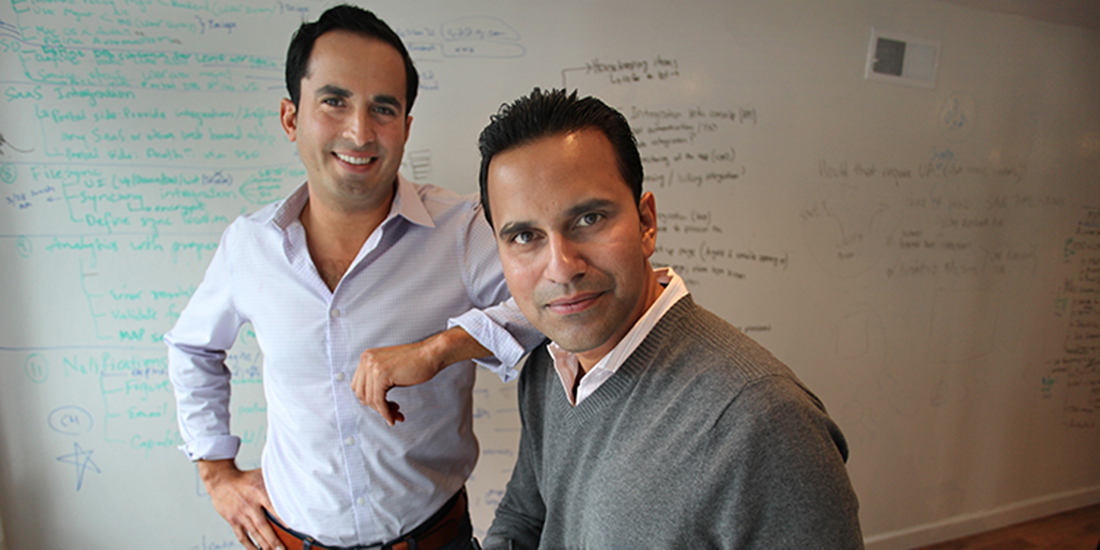 Farshad Ghaffari at left, and Sid Yenamandra, Berkeley Engineering alumni and founders of Entreda, in their San Mateo office. Photo by Thomas Walden Levy
Farshad Ghaffari at left, and Sid Yenamandra, Berkeley Engineering alumni and founders of Entreda, in their San Mateo office. Photo by Thomas Walden LevyBuddy-movie tech entrepreneurs
One night in 1997, Sid Yenamandra (B.S.’99 EECS) marched across campus berating himself. The intense, driven junior was worried he’d just blown a midterm exam in CS 61A, the introductory computer science course for EECS majors at Berkeley. “What’s going on?” asked his classmate, Farshad Ghaffari (B.S.’99 EECS).
The ensuing conversation began a friendship that has lasted through a stint as college roommates, a decade in Silicon Valley and four years building a startup together. In many ways, their story resembles a script for a tech-entrepreneur-themed buddy movie.
“The reason we are where we are now is because it’s ‘two for the journey’ as opposed to just one,” says Yenamandra, 37, who along with Ghaffari, 38, co-founded Entreda in 2011. Their company offers a cloud-based package of IT applications, including data backup, WiFi, networking, storage and cybersecurity.
Fittingly, in their office overlooking downtown San Mateo, California, these computing comrades sit at twin desks. They say that this year, their 15-employee company is on track to break even for the first time, with a sales pipeline in the $5 to $10 million range.
Right now, they are bubbling with excitement about the prospects for Unify, an integrated IT software suite they designed for small businesses. Their product has been gaining traction with registered investment advisors, who nationally manage more than $2 trillion in assets. Unify aims to do for financial services firms what credit card fraud-detection systems do for companies like Visa and MasterCard.
After graduating from Berkeley in 1999, Yenamandra and Ghaffari worked in the Valley for such giants as Broadcom and Sun, and for smaller firms like Netlogic, Exar, Mindspeed and PacketFX.
With startup experience under his belt, Yenamandra brainstormed how to start a company of his own. “Always solve a problem you want to solve for yourself,” he says. “Because that ends up being more meaningful than arbitrarily picking a project because you think it’s cool.”
The pair initially focused on a simple domestic question: How to eliminate the nest of cables and boxes that constituted the IT system of Yenamandra’s wife’s dental practice.
“It was gobbledygook, a mess of wires,” he says. “Trouble-shooting this thing was a nightmare.”
It was obvious to Yenamandra that many small businesses weren’t taking full advantage of new IT technologies. And multi-billion-dollar tech companies like Netgear, Cisco, Linksys and Symantec were going after bigger game.
“So we set out to build a Roku of IT services for small businesses,” says Yenamandra. Their goal an IT system as user-friendly and compact as the device used to stream entertainment programming onto a television.
“IT that’s simple, easy to use, but that’s on an enterprise or business-grade platform,” says Ghaffari. “Plug and play, so anyone could use it and not have to go through the pain. Take away the custom part so you don’t have to hire an IT expert, and manage it from the cloud.”
“And one neck to grab if something goes wrong,” says Yenamandra, completing their pitch.
When they won “Best of Show, New Product,” at the national IT Expo in Austin in 2012, it was an explosive boost to their business. The budding entrepreneurs got more orders than they could handle, and faced the problem of how to scale up — fast.
But they soon realized they were not quite ready for prime time. “We had built a couple of prototypes and unveiled them at the show, but we really didn’t have product we could put in the hands of customers,” says Yenamandra. “We had to say no to a lot of people.”
“One thing our Berkeley education taught us is to persevere — to keep going in spite of the obstacles thrown at us,” says Yenamandra.
Back at the drawing board, Ghaffari and Yenamandra began focusing their attention on a select group of customers from the financial services industry. They felt sure these clients represented the tip of a business market iceberg.
“Then we realized, holy cow, our platform is actually a cybersecurity threat mitigation product or risk management platform for large financial services firms with many small branch offices — like TD Ameritrade, Fidelity and LPL Financial,” says Yenamandra. “We basically verticalized a horizontal product.”
Yenamandra and Ghaffari had found the “driver” that would convince financial services firms and their affiliated investment advisors to buy Unify. It not only offers advisors an integrated suite of essential IT services, it protects them and their clients from cybercriminals, while simultaneously reassuring financial regulators that customer information is protected.
The two entrepreneurs have come a long way, from undergrad classmates to running a multi-million dollar company on its way to tripling its sales in one year.
“The entrepreneurial journey is a long and arduous one,” says Yenamandra. “It’s a marathon, not a sprint.”
